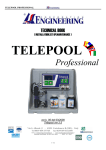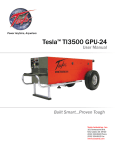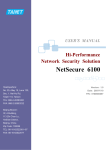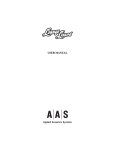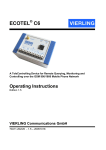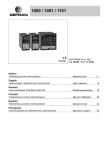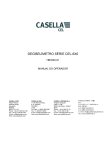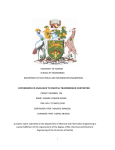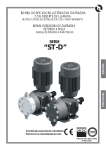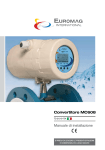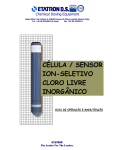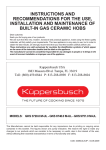Download User Manual
Transcript
Magnetic Flow Meter with Converter TD 206-0-ENG User Manual UNI EN ISO 9001 : 2000 9190.ETAD READ AND KEEP THESE INSTRUCTIONS IMPORTANT WARNING BEFORE INSTALLING OR INTERFERING WITH THE APPLIANCE IN ANY WAY, FIRST PLEASE READ THE INSTRUCTIONS CONTAINED IN THIS MANUAL AND FOLLOW THEM CAREFULLY. THE MAKERS WILL NOT BE RESPONSIBLE FOR ANY EVENTUAL DAMAGE INCURRED DUE TO NOT HAVING READ THE MANUAL PROPERLY. This equipment has been built to work without incurring risks as long as it is used for the sole purposes specified: 1. Installation, management and maintenance have to be followed according to the instruction manual 2. Environmental conditions and power supply remain within the specified limits. Any other use or modifications beyond those expressly authorized by the makers, will be seen as improper use of the equipment. Any responsibility for damage or interference due to improper use will be the complete liability of the user and automaticlly result in cancellation of the guarantee. Be aware that this device contains electrical components which have an electrical current and so any form of servicing or maintenance must be carried out by expert and qualified personnel, who are aware of all necessary precautions. Before opening up any inside parts, please cut off the power supply.This manual refers to a meter conforming to Norm EN 50082, -2 (immunity) AND EN50081-2 (emissions), belonging to class A. It is also essential to read the instruction sheet accompanying the meter and contained in the packaging. The meter is composed of metal and plastic parts, all of which left our factory in compliance with local norms and requirements concerning their garbage disposal. READ AND KEEP THESE INSTRUCTIONS We want to save you time and money! We assure you that by reading the whole manual you will have correct installation and enjoy the product in complete safety. ETATRON DS | 3 WARNING! RISK OF ELECTRIC SHOCK ANY OPERATIONS INDICATED BY THIS SYMBOL, MUST BE CARRIED OUT EXCLUSIVELY BY QUALIFIED TECHNICAL PERSONNEL DANGEROUS ELECTRIC CURRENT WARNING! VITALLY IMPORTANT INFORMATION AND POINTS TO OBSERVE. PLEASE CONSULT THE ACCOMPANYING DOCUMENTS . NOTE INFORMATION AND PARTICULARLY IMPORTANT POINTS TO OBSERVE CE/EMC/Standards The manual describing this flow meter conforms to the following safety rules: • EMC Directives 89/336/EEC AND 93/68/EEC; EN 61326-1 (1997), A1(1998), A2 (2001), A3(2003) • Low Voltage Directives 73/23/EEC and 93/68/EEC • It belongs to class A. It is also essential to read the instruction sheet accompanying the meter and contained in the packaging. 4 | ETATRON DS INDEX 1. PRELIMINARY NOTES 7 2. GENERAL PRECAUTIONS 7 3. INSTALLATION OF THE SENSOR 9 3.1. IDENTIFYING REGISTRATION NUMBER 3.2. The direction of the liquid into the sensor - reading the polarity indicated on the arrow 3.3. Hydraulic collocation 3.3.1 Positioning as regards the plant 3.3.2 Positioning as regards energy flow 3.3.3 Important guidelines concerning fixing 3.3.4 Tables for tightening torque and equivalent pressure 3.3.5 Important guidelines concerning positioning of the pipes 3.3.6 Important guidelines regarding external strain of various types 9 9 10 10 10 11 12 14 18 4. ELECTRICAL EQUIPOTENTIAL EARTHED CONNECTIONS 21 5. PRESSURE IN THE PIPES, INFERIOR TO ATMOSPHERIC PRESSURE 23 6. CONVERTER 25 6.1. Installation 6.1.1 Identifying registration number 6.1.2 Compact version 6.1.3 Separate version 6.1.4 Electrical connections 6.1.5 Output On/off 6.1.6 Output totalizer / frequency 6.1.7 Output alarm /dosage 6.1.8 Digital Input 6.1.9 Standard Interface RS485 6.1.10 Casing with earthed connection 6.1.11 Connection to the electrical supply 6.1.12 Fuse 6.2. Programming of converter 6.2.1 Control device 6.2.2 Programming 6.3. Alphabetical list of functions 25 25 25 26 28 28 30 31 32 33 34 34 34 35 35 36 38 ETATRON DS | 5 7. METER SIGNALS FOR CHECKING OR REPAIR 57 8. APPENDIX 1 - COMPACT AND SEPARATE VERSION ASSEMBLY 59 9. APPENDIX2 - MEANING - OPERATION – PROGRAMMING MODE FOR CERTAIN OPERATIONS 61 9.1. SETTINGS › PULSATION filter SETTINGS › Block flow SETTINGS › Peak suppression SETTINGS › Bypass filter 9.2. Advanced › Output signals (impulses or frequency) 61 10. APPENDIX3 – ERROR OR ALARM MESSAGGES SHOWN ON DISPLAY 65 11. APPENDIX4 - PROBLEMS AND SOLUTIONS 67 6 | ETATRON DS 62 PRELIMINARY NOTES - GENERAL PRECAUTIONS 1. PRELIMINARY NOTES The parts making up the electromagnetic flow meters are: A. The sensor – which is inserted into the pipes using flanges or threaded or clamp attachments B. The converter – which may be inserted on the side of the sensor (in a compact way), or immediately nearby (by a separate operation) and attached by two cables. 2. GENERAL PRECAUTIONS The correct lifting method is shown in the figure on the right, while the one in the figure on the left is to be avoided at all costs; more importantly , DO NOT lift the meter by its converter but by holding it on its sides. f. 1 f. 2 In addition: DO NOT move the meter with the lifting device without the original packaging contents or aid of an appropriate support, offering the same guarantee of stability. f. 3 ETATRON DS | 7 8 | ETATRON DS INSTALLATION OF THE SENSOR 3. INSTALLATION OF THE SENSOR 3.1 IDENTIFYING REGISTRATION NUMBER The tag located on the sensor carries the following data: • MODEL: • PART N°: part number identifying the instrument (identification number for tracing identity) • DN: nominal diameter [or mm] • PN nominal pressure [bar] • Temp.: maximum fluid temperature for processing • IP: degree of international protection • ELECTRODES: material composition of the electrodes • LINING: internal lining material • KA, KB: calibration coefficients • ITEM: other particular guidelines f. 4 3.2 DIRECTION OF THE LIQUID IN THE SENSOR - READING OF POLARITY AS INDICATED ON ARROW In the sensor, if the liquid flows: • in the same direction as the arrow (enter by – and exit by +), the flow is positive and a neutral sign will appear on the display; • in the opposite direction to that indicated by the arrow (enter by + an exit by –), the flow is negative and a negative sign will appear on the display. FLOW From – to + From + to – direct flow inverse flow neutral signal negative signal ETATRON DS | 9 3.3 HYDRAULIC COLLOCATION 3.3.2 POSITIONING AS REGARDS LIQUID FLOW 3.3.1 POSITIONING WITH REGARDS TO THE PLANT If the meter is assembled on horizontal pipes, the converter (or the junction box in the separate version) has to be found on the upper part. For the sensor to work efficiently, the important guidelines shown in figure 5 must be followed carefully. The meter must remain below the hypothetic blue line (line showing ground water level ) which unites the two liquid levels for measuring. TOP f. 5 f. 7 Avoid placing the meter above the ground water level line joining the two levels. In the case of obstruction and the eventuality of having to position the sensor in a different way, follow the guidelines as explained in the following diagrams: f. 6 f. 8 10 | ETATRON DS INSTALATION OF THE SENSOR Avoid those positions. 3.3.3 IMPORTANT GUIDELINES CONCERNING FIXING In the case of the pipes having been judged unsuitably large for installation, do not attempt to bring the two parts of the pipes together by tightening the screws but instead make full use of the elastic supports on either side of the sensor. Any tightening of the screws without having seen and made use of the elastic supports first, will result in damage to the meter and loss of guarantee. f. 9 If the meter is assembled on vertical pipes the flow of the liquid has to be in an upward direction to ensure complete filling of the sensor. f. 11 For correct installation, the inclination towards the counter flanges must not be excessive, with the maximum distance allowed between the upper and lower parts, as a result of any eventual imbalance, never exceeding 5 mm. L max. - L min. ≤ 5 mm. L max L min f. 10 f. 12 ETATRON DS | 11 3.3.4 TABLES OF PAIRS OF TIGHTENING TORQUES AND CORRESPONDING PRESSURE Take care to follow instructions very carefully for the paired tightening of torques of the bolls shown in the table, check carefully for the correct centering of the sensor before securing the flanges and then proceed following the steps now indicated: 1. approx 50% couple maximum; 2. approx 80% couple maximum; 3. approx 100% couple maximum. MUT 1100 EN PP & 1100J EN PET Sensor Max operative pressure [bar] [psig] DN 40 ≤10 ≤145 ≤10 DN 50 ≤145 DN 65 ≤10 ≤145 ≤10 DN 80 ≤145 DN 100 ≤10 ≤145 ≤10 DN 125 ≤145 ≤10 DN 150 ≤145 DN 200 ≤10 ≤145 1 1/2” 2” 2 1/2” 3” 4” 5” 6” 8” 12 | ETATRON DS ≤10 ≤10 ≤10 ≤10 ≤10 ≤10 ≤10 ≤10 ≤145 ≤145 ≤145 ≤145 ≤145 ≤145 ≤145 ≤145 f. 13 Flanges pipes flange class DN 40 PN 16/40 DN 50 PN 16/40 DN 65 PN 16/40 DN 80 PN 16/40 DN 100 PN 16/40 DN 125 PN 16/40 DN 150 PN 16/40 DN 200 PN 16/40 1 1/2” 2” 2 1/2” 3” 4” 5” 6” 8” 150/300 150/300 150/300 150/300 150/300 150/300 150/300 150/300 Max for tightening torque [Nm] [ftlb] 25 13 19 35 19 35 19 35 24 45 35 65 45 85 53 100 25 35 35 35 45 65 85 100 13 19 19 19 24 35 45 53 INSTALATION OF THE SENSOR MUT 2200 IN PTFE OR EBONITE Sensor DN 25 DN 40 DN 50 DN 65 DN 80 DN 100 DN 125 DN 150 DN 200 DN 250 DN 300 1” 1 1/2” 2” 2 1/2” 3” 4” 5” 6” 8” 10” 12” Max operative pressure [bar] [psig] ≤40 ≤580 ≤40 ≤580 ≤40 ≤580 ≤40 ≤580 ≤40 ≤580 ≤40 ≤580 ≤40 ≤580 ≤40 ≤580 ≤16 ≤230 ≤16 ≤230 ≤16 ≤230 ≤40 ≤40 ≤40 ≤40 ≤40 ≤40 ≤40 ≤40 ≤16 ≤16 ≤16 ≤580 ≤580 ≤580 ≤580 ≤580 ≤580 ≤580 ≤580 ≤230 ≤230 ≤230 Flanges pipes flange class DN 25 PN 40 DN 40 PN 40 DN 50 PN 40 DN 65 PN 40 DN 80 PN 40 DN 100 PN 40 DN 125 PN 40 DN 150 PN 40 DN 200 PN 16 DN 250 PN 16 DN 300 PN 16 1” 1 1/2” 2” 2 1/2” 3” 4” 5” 6” 8” 10” 12” 300 300 300 300 300 300 300 300 150 150 150 Max for tightening torque [Nm] [ftlb] 30 16 21 40 26 48 21 40 26 48 60 112 67 125 69 130 59 110 100 110 69 130 30 40 48 40 48 112 125 130 110 110 130 16 21 26 21 26 60 67 69 59 100 69 ETATRON DS | 13 3.3.5 IMPORTANT GUIDELINES FOR POSITIONING IN RELATION TO THE CONDUCTORS For the instrument to work correctly please respect the important guidelines show in the following diagrams. In the case of erroneous assembly correct working of the instrument will not be guaranteed. Maintain the distances as shown in the diagram, where DN stands for the nominal diameter. This serves in any case to avoid the formation of air bubbles and guarantee a complete replenishment of the sensor in addition to regulating fluid flow. f. 15 • Maintain a distance between the sensor axis and that of any eventual flood gate amounting to no less than 5 m • Be careful to instal the sensor under water head so as to guarantee complete replenishment even in the absence of liquid flow 5xDN at upstream and 3xDN at downstream from the meter. This represents the correct installation know as “by syphoning” f. 16 f. 14 • In the case of there being connections between various tubes you will need to incorporate a rectilinear line lengthways compared to the previous case (for example 10DN) 14 | ETATRON DS INSTALATION OF THE SENSOR ADVISABLE POSITIONING ( ) AND OTHERS TO AVOID ( ): • The position on the left is correct, the other two ARE NOT. • This installation guarantees permanent replenishment of the sensor f. 19 • DO NOT place the sensor after any variation in the trajectory of the liquid flow. f. 17 • This installation DOES NO guarantee any permanent replenishment of the sensor. f. 20 f. 18 ETATRON DS | 15 • DO NOT place any intercepting sluice-valves upstream From the sensor, onto the flow pipes • NOT instal the sensor in any position ( ) that might empty it naturally (by gravitational pull); but rather install it at points which guarantee it remains full even at the various speeds of the fluid to be processed. f. 21 • Install the sensor downstream (after - send) from an eventual pump and , NEVER upstream (before-aspiration). f. 22 16 | ETATRON DS f. 23 INSTALATION OF THE SENSOR • DO NOT USE the sensor as a support for tubes afferent to it. • It is strongly advised that the user adopts the various positions shown at the side. f. 24 • The tubes afferent to the sensor, may also serve as structural supports . f. 26 • AVOID any of the following positions. f. 25 f. 27 ETATRON DS | 17 UNDERGROUND INSTALLATION 3.3.6 IMPORTANT GUIDELINES CONCERNING EXTERNAL STRAIN OF VARIOUS TYPES • For underground installation a suitably inert material is advised for filling the hole; with the placing of a protective cover over the top being also strongly advised. This serves the double purpose of sending signals (“device under the cover”) as well as providing mechanical protection from sinking and/or any yielding of the filler material that is not engorged. • Install suitable antivibrational protection where the pipes are, to prevent the introduction of any eventual vibrations. Protective cover f. 29 Fill with a material of adequate apportions • NOT subject the meter to vibrations and/or movement, which may harmfully affect operations and the duration of such. AVOID ANY EXCESSIVE VIBRATIONS f. 28 f. 30 • AVOID exposure of the meter to strong or nearby magnetic fields. f. 31 18 | ETATRON DS INSTALATION OF THE SENSOR • Protect meter if exposed to direct radiation from the sun; take adequate precautions to shelter it by the provision of a hood. • For a normal and efficent working of the meter: - The environmental temperature should be limited to intervals of (-20 ÷ +60) °C; - The temperature of the fluid to be measured should be within the intervals (-10 ÷ +80)°C. ENVIRONMENTAL TEMPERATURES TEMPERATURE OF THE OPERATION f. 32 • Radiation directly hitting the front of the IR sensor may result in loss of data. f. 34 f. 33 ETATRON DS | 19 20 | ETATRON DS ELECTRICALLY EARTHED EQUIPOTENTIAL CONNECTIONS 4. ELECTRICALLY EARTHED EQUIPOTENTIAL CONNECTIONS • To guarantee the meter’s correct electrical operation it is essential to earth equipotential connections as indicated in the figure at the side, as without such connections, the meter will not work. SCREWS FOR EARTHED CONNECTIONS f. 35 • The sensor converter casing must also be earthed. The earthed connections must be carried out using the appropriate connections (nuts/screws) situated in the lower part of the converter.The correct execution of such connections is essential for any efficient working of the device. f. 36 ETATRON DS | 21 • If you use a sensor with two electrodes and the tubing is made of insulating material, two earthed metal rings of equipotential connections have to be inserted between the meter and the counterflange.In the case of a three electrode sensor the connection between the sensor’s fluid and body is guaranteed by the earthed electrode and he earthed rings are unnecessary. f. 37 • If you are using pipes with cathodic protection, follow the instructions shown in the figure. D B G R R B B D G B REFERENCES B Insulating bushings G Insulating gaskets D Metallic earthed disc R Insulated sensor lining B B B B f. 38 22 | ETATRON DS PRESSURE IN THE PIPES, LOWER THAN THAT OF THE ATMOSPHERE 5. PRESSURE IN THE PIPES, LOWER THAN THAT OF THE ATMOSPHERE If the meter is inserted into one of the pipes, a pressure level below that of the atmosphere may be result (absolute PRESSURE < 100 kPa = 1 bar = 1000 mbar) you need to check if the lining is capable of resisting such working conditions. The following shows the absolutely minimum pressure levels allowed, below which problems may arise concerning the electrode’s stability. These minimum values depend as one might expect, on diameter, type of lining and temperature of the liquid. ABSOLUTE VACUUM LEVEL S [mbar] ALLOWED inside the sensors DN [mm] 3÷20 25÷80 25÷80 40÷80 40÷80 100÷150 100 100÷150 100÷150 200 250 300 200 250 300 350 400 ------- MODEL MUT 500 MUT 2200 MUT 2400 MUT 1000 MUT 1100 MUT 2200 MUT 2400 MUT 1000 MUT 1100 MUT 1000 MUT 1000 MUT 1000 MUT 2200 MUT 2200 MUT 2200 MUT 2200 MUT 2200 MUT 2700 MUT 2770 LINING PTFE PTFE PTFE PTFE PP OR PET PTFE PTFE PTFE PP OR PET PTFE PTFE PTFE EBANITE EBANITE EBANITE EBANITE EBANITE ------- 20°C 0 0 0 0 0 150 250 150 0 200 300 400 0 0 0 0 0 300 300 80°C ---0 250 250 0 250 350 250 0 300 400 500 0 0 0 0 0 300 300 140°C 0 130 400 130 ---400 500 400 ---400 500 600 ---------------------- ETATRON DS | 23 24 | ETATRON DS CONVERTER 6. CONVERTER Please refer to the safety information reported at the start of the manual under the paragraph IMPORTANT WARNING 6.1 INSTALLATION 6.1.1 IDENTIFYING REGISTRATION NUMBER The registration number located on the converter displays the following information: • MODEL: converter model • IP: degree of converter protection • PART N°: serial number identifying the instrument • Temp.: minimum/maximum temperature of working conditions • POWER S: voltage supply • HZ: frequency of voltage supply • COUPLING: identification number of sensor paired to converter • OPTIONAL: eventual modules that may be added f. 39 6.1.2 COMPACT VERSION Figure 40 represents the converter in compact layout. f. 40 ETATRON DS | 25 When the converter is supplied in compact version all the electrical connections between itself and the paired sensor have already been preset. To proceed to start to use the device you have to follow the output connections as requested and according to what is indicated in the paragraph and thereafter. Only after having carried out the output connections can you tap into the electricity supply network, as outlined in the following paragraphs. By loosening the fixing screws which connect the converter to the support stirrup you can rotate the converter by 90° in both directions from the sensor. Once the new position of the converter is secured the screws must be correctly tightened to guarantee the converter its correct degree of protection. The converter may not be exposed to vibrations; in the event of the tubes being subject to vibration, use the separate version. 6.1.3 SEPARATE VERSION WARNING! ONLY QUALIFIED TECHNICAL PERSONNEL MAY HAVE ACCESS TO THE SPARE JUNCTION BOX. In order to carry out pairing of the sensor, connect the converter to the paired sensor using the two cables supplied. The paired sensor is the one whose identification number is shown on the converter tag in the COUPLING box. (Should no identification number be visible in the box then the converter cannot be paired with any of Etatron DS International sensor products). For introduce the cables into the junction box use the exits with a cable gland located in the lower part of the box. For the 2 or 3 electrode sensor, connect the cable ends in the clamps located in the spare junction box and follow the instructions shown for the 4 electrode sensor with an empty tube alarm etc. (CLAMP “T”). The C012 (reels) cables and C013 (electrodes) type are supplied with of tags and identifying letters: refer to these in order to proceed correctly to the connection between sensor and converter. Take great care with the correct sequence of the terminals in order to avoid wrong connections and ensure good electrical contacts. Do not employ cables other than those supplied with theproducts or else the user runs the risk of changing the measurements (the cable has been “adjusted” to the system). DANGEROUS ELECTRIC CURRENT WARNING! Figure 41 shows converter in a separate version. In the lower part of the converter box there is a spare junction box in which the C012 and C013 cables, connecting sensor and converter should be connected. The converter in a separate version may be installed either onto the wall or a pole mount, using the device supplied as shown in the same diagram. 26 | ETATRON DS BEFORE SWITCHING ON THE ELECTRICITY SUPPLY METER, SWITCH OFF THE JUNCTION BOX OF THE SENSOR AND THAT OF THE AUXILIARY WITH THE RIGHT COVER DANGEROUS ELECTRIC CURRENT CONVERTER f. 41 NOTE THE JUNCTION BOX OF THE SENSOR (THIS IS PRESENT IN ALARM OF THE SENSORS, EXCLUDING THE MUT 500) AND IS BUILT TO GUARANTEE A IP68 DEGREE OF PROTECTION (PERMANENT IMMERSION OF THE SENSOR A 1,5 M UNDER WATER), WITH THE EXCEPTION OF THE MUT1100MODEL. This result may be obtained only if the necessary electrical connections have been made. • The cables have been correctly secured with the right loop cable glands, • If the box’s tightening screws have been securely fastened. To guarantee their tightness the junction box has to be filled with the resin supplied by the makers after having correctly performed the connection of the cables. Check also that the electrical connections have been done properly. f. 42 ETATRON DS | 27 6.1.4 ELECTRICAL CONNECTIONS WARNING! ONLY QUALIFIED TECHNICAL PERSONNEL MAY HAVE ACCESS TO THE COMPARTMENT UNIT CLAMP. DANGEROUS ELECTRIC CURRENT Figure 43 shows the unit clamp and each of its functions The electrical connections and those to the electricity supply network are to be carried out in the clamp unit. Access to this may be gained by removing the backcover of the converter. Convertitore Morsettiera I/O For cable entry into the box converter use the lateral entry and exit points provided by the cable gland. Use specific entry and exit points for the cable’s electricity supply and for input/output. To guarantee a correct degree of protection to the converter, tightening of the cable glands must be carried out correctly and the cables used must possess a nominal external diameter of no less than 7 mm. The method for using the various outputs and relative electrical connections is presented in detail in the following paragraphs. Uscita Analogica 4(0) 20 mA Uscita Impulsi/ Frequenza Ingresso Digitale Reset Comunicazione Seriale RS 485 Uscita Digitale Allarmi f. 43 6.1.5 OUTPUTS ON/OFF Different types of receivers may be connected to these exit points. In the diagrams that follow the main types of connections that may be used are summarized in the relevant paragraphs while the corresponding paragraphs describe how to use the outputs as well as possible settings The converter is equipped with 2 exit points ON/OFF: 28 | ETATRON DS CONVERTER CLAMP COLLECTOR 9 7 OUTPUT Accumulation/freq. Alarms/dosage CLAMP EMITTER 8 6 As regards the diagrams below, if the output is destined for a “charge” such as an impulse counter, an electromechanical preselector or a power relay (Alarm at 24 VDC), the equivalent screens are of type A (when carrying out connections between emitter and clamp 14) or type B (carrying out connections between collector and clamp 10). If on the other hand you have to use an electronic impulse counter or a PLC, having supplied input, the relevant screens will be of type C or D. Tipo C 10 + 24 V 9 C + DRIVER B 24 V E 8 Tipo A 10 14 CHARGE + 24 V Tipo D 9 C 10 DRIVER B E + 24 V 8 9 C DRIVER 14 B E 8 + Tipo B 24 V 14 10 + 24 V f. 45 9 C DRIVER B NOTE E 8 CHARGE TOTAL NUMBER OF THE ON/ OFF OUTPUT ABSORPTIONS (CURRENTS) MUST NOT EXCEED 100 Ma 14 f. 44 ETATRON DS | 29 6.1.6 ACCMULATION OUTPUT/FREQUENCY LEVEL 0 0 24 V 1 + 7 8 9 10 11 12 13 14 15 16 1 Mechanical Counter PARAMETERS Volume of 1 impulse Duration of impulse Output bottom of the scale for frequency Output signals (frequency or impulses) t1 = + 8 9 10 11 12 13 14 15 16 Mechanical Counter Fig 46 shown illustrates two possible electrical connections for impulse counters or electromechanical presetters of type 24VDC. These are: 30 | ETATRON DS Basics Impulse duration Bottom of the scale (B.S.) frequency Output signal Advanced Advanced 1000 [ms] 2t (1) When on the other hand, the appliance is preset for output impulses, the duration of t1 may be set by entering the submenu “Impulse Duration of ” on the menu “Basics”. Defined parameters: Qmax = maximum capacity [l/s]; V1 = volume corresponding to 1 impulse [l], t1 = duration of of 1 impulse [ms]; The maximum frequency f max which is attained at maximum capacity is: t max = In defining the parameters which have an influence on the maximum frequency f max, able to be generated bear in mind how useful the impulse counter can prove, which has been selected for that frequency. SUBMENÚ Impulse Value When the appliance is set for frequency output, the duration of the impulse t1 is set automatically.This results, at any frequency f as: 24 V 7 MENU Basics Qmax V1 [impulses/s] = Qmax V1 [Hz] (2) This frequency fmax might NOT be attainable, if a too long impulse duration t 1 has been introduced. The maximum duration of t 1 that may be introduced for attaining the fmax frequency is supplied by (2) is: CONVERTER 1000 t1 = [ms] 2fmax 6.1.7 OUTPUT ALARM/DOSAGE (3) Type A In choosing the impulse counters you must therefore check: 10 CHARGE + 24 V 1. if you can reach the fmax frequency given by (2) (device is preset for an impulse output) 7 C DRIVER B E 2. if you can work with an impulse t1 lasting less or the same as the value as defined by (3). 6 NOTE EVEN IF ONLY ONE OF THESE CONDITIONS IS NOT CHECKED, V1 MUST BE INCREASED OR THE IMPULSECOUNTER REPLACED. 15 Type B 10 + 24 V 7 C FOR EXAMPLE: DRIVER B E Using impulse output with the following data: capacity of B.S. = 2,7 m3/h = 0,75 l/s 6 CHARGE 15 When aiming at 1 impulse /cm3, that is V1 = 0,001 l then the maximum fmax frequency will be [see equation (2)]: Type C 10 tmax = 0,75 = 750 Hz 0,001 + 24 V 7 C And the impulse duration should be less or equal to: + DRIVER t1 = 1000 = 0,67 ms 2 x 750 The impulse-counter should be able to work above 750 Hz and with impulses of a maximum duration of 0,67 ms B 24 V E 6 15 ETATRON DS | 31 The output alarm / dosage gets switched to (ON) in one or more of the following conditions (if enabled, see the submenus of the ALARMS and SPECIAL FUNCTIONS menu): Tipo D 10 + 24 V 7 C B DRIVER E 6 + MAXIMUM CAPACITY ALARM MINIMUM CAPACITY ALARM ALARM TUBE EMPTY ALARM OUT OF RANGE DOSAGE IN PROGRESS 24 V 1 15 f. 47 + 8 9 10 11 12 13 14 15 NOTE IF NONE OF THESE FUNCTIONS ARE ENABLED, THE OUTPUT ALARMDOSAGE GETS SWITCHED ON (ON) WHEN THE CAPACITY IS INVERSE. 24 V 7 Electronic contact switched off (Electronic Switch) 16 6.1.8 DIGITAL INPUT This input allows: 1. Zeroing or blocking of the internal totalizers via remote control (See the various submenus of the METER menu); 2. The start of the right dosage selecting the Dosage mode (see the SPECIAL FUNCTIONS menu). 3. The start of the autocalibration process (see the SYSTEM >CALIB ZERO EXT), 24 V + 7 8 9 10 11 12 13 14 15 16 This command has to have a voltage level between 3 and 33 V. Input resistance is 1800 Ohm. f. 48 32 | ETATRON DS CONVERTER Fig.49 a) shows command featuring press-button and external voltage source A fig. 49 b) shows the same control but using a 24 V tension available between clamps 10 and 14: 1,8 KOhm + - fig. 49 c) shows a reset control (or Block) coming from a digital device 11 12 13 14 15 6.1.9 INTERFAZ ESTÁNDAR RS485 _ + + - 3........33 V 1 2 3 4 5 6 7 8 9 10 11 12 13 14 15 16 17 18 19 20 B TRM 200 1,8 KOhm + RS 485 screen TRM 200 - 10 11 12 13 14 15 max 1500m f. 50 The standard interface RS485 is available between clamps 16 and 17 (screen on 11). It may be adopted for example, to dialogue with theTRM 200 (remote repeater) connectable by a cable of 1500 m of maximum length. C NOTE 1,8 KOhm + INTERFACE RS485 ALLOWS FOR A NETWORK CONNECTION FOR MANY TYPE CONVERTERS (UP TO 32 UNITS) AND/OR PC CONNECTION. THE MATERIAL CONCERNING POSSIBLE SERIAL COMUNICATIONS WITH IS PROVIDED IN THE TECHNICAL LITERATURE TD155, WHICH IS AVAILABLE ON REQUEST. FOR FURTHER INFORMATION PLEASE CONTACT TECHNICAL ASSISTANCE. 11 12 13 14 15 3........33 V f. 49 ETATRON DS | 33 6.1.10 EARTHED CASING 6.1.12 FUSE The converter casing should be earthed. This connection should be carried out by earthing the bolt located in the lower part of the converter. WARNING! SHOULD THE NEED ARISE THE FUSE MUST BE REPLACED ONLY BY QUALIFIED TECHNICAL PERSONNEL NOTE DANGEROUS ELECTRIC CURRENT MAKING A PROPER CONNECTION IS ABSOLUTELY NECESSARY FOR AN EFFICIENT WORKING OF THE DEVICE The fuse is located in the clamp unit, of the fast-blow type, 5x20, 250 V. Depending on its voltage supply , its value is: 1 A for voltage 90 ÷ 264 VAC 2 A for voltage 24 VAC/VDC 6.1.11 CONNECTION TO THE ELECTRICITY SUPPLY WARNING! THE OPERATION SHOULD ONLY BE CARRIED OUT BY QUALIFIED TECHNICAL PERSONNEL DANGEROUS ELECTRIC CURRENT Only having carried out all the other electrical connections, can you proceed to connecting the converter up to the electricity supply. The voltage is indicated on the supply clamps: With these directions: 90 ÷ 264 VAC 24 VAC/VDC 34 | ETATRON DS The appliance may be supplied with voltage Alternating AC, BY 90 at 264 V, 50/60 Hz Alternating AC, BY 20,8 at 27,6 V 50/60 Hz Or Direct DC by 19 at 33 V (regardless of polarity) Supply Supply 19-33 V DC 19-33 V AC Supply 90-264 V AC f. 51 CONVERTER For the instrument to work properly and to guarantee the degree of protection expected, the cap of the instrument’s display unit must be completely screwed into the central body of the light pen. 6.2 USE OF THE CONVERTER 6.2.1 CONTROL DEVICE The converter is designed with a keyboard which has infrared receivers. To use this requires the light pen supplied by the makers. All programming operations in the following paragraphs can be carried out without removing the display unit cover. Each time the button (A) is pressed in the upper part of the light pen it corresponds to the release of a command signal for the converter keyboard. A A C B Should you not have the light pen you can use the keyboard located under the serigraphic template. However the use of that keyboard must be reserved for emergencies only when no other alternatives exist. In order to access the keyboard the unit display cap and the seragraphic template must first be removed. Once the unit display cap has been removed be extremely careful as parts of the converter which may be potentially dangerous become accessibile. The operations described must be carried out by qualified personnel. Without the seragraphic templates on the converter receivers, if exposed to sunlight, they may provoke false contacts, so proceed to operations on the emergency keyboard being careful to avoid direct radiation of the converter. For the device to work correctly the light pen must be brought close to the front part of the converter, then hold down the button on the pen for about one second. To enhance signal input the light pen has to be placed on the front porthole corresponding to holes located on the serigraphic mask. In this way the emitter which supplies it (B), is near to the receivers on the converter. Keeping the press-button held down on the light pen will cause the converter to restart. The light pen is supplied by four Cell LR41 buttons, which to substitute them requires that the back of the pen cover be unscrewed. There is a chain in the back part of the pen to attach it for safety and avoid losing it. ETATRON DS | 35 6.2.2 PROGRAMMING To facilitate access to the various functions of the converter you may find the flow chart shown on the following page useful. This is divided into a main Menu and different Submenus. For access to the various functions on the main menu press : and one of the main options of the main menu will appear on the first line of the display: • Basics • Advanced • Meter • Alarms • Settings • Special functions • System • Reserved With the arrow choose the main menu option you are interested in and with the arrow then choose the option you are interested in from the submenu. The submenu of the“BASICS” menu includes the most important and common parameters. These may be read (but not modified) by making your selection using the arrow and by then pressing. In order to modify these parameters you must first introduce a key word and then proceed according to the instructions which explain how you change all the of the other menu parameters. Some examples of programming may be found on the following pages. 36 | ETATRON DS B.S. Frequency Output signals Electrical Field Zero Calibration T.V. Control T.V. threshold Key word B.S. Flow. Impulse Value Impulse Duration Nominal diameter Coef. Ka Coef . Kb Advanced Basics Curr. Fault Freq. Fault Reset. Ext. Part. Direction Tot. Ext. Block Tot. Hysteresis Al. Min. Threshold Al. Max.Threshold Al. Al. Out of Range Al. T. V. sft. Min. Flow Al. Max. Flow Al. Alarm Reset. Ext. Tot. - Reset. Ext. Part. + Reset. Ext. Tot. + Reset. Part. - Reset. Tot.- Reset. Part. + Reset Tot.um. + Meter Language Mess. Decimal Tot. Bypass Filter Peak Su ppress. Flow Suppress. Pulsation Filter Settings Spec.Weight Speed RS485 Addr RS485 Visualize D.I. Period D.I. Setting Datalog. Enable Datalog. B.S. Low Dual Range Autocor. Dosage Q.ty Dosage Enable Dosage Special Functions Load 2nd copy Save 2nd copy Pass. Lev. 1 Simulation Date and hour Ext. Zero Cal. Autocal. Speed Field System CONVERTER f. 53 ETATRON DS | 37 6.3 ALPHABETICAL LIST OF FUNCTIONS In the following tables the functions present in the menu and submenu of converter are shown in alphabeticaI order. SUBMENÚ Enable Dosage Enable datalog. Alarm outside scal Alarm Flow MAX Alarm Flow MIN Alarm TV softw Autocalibrat Autocur dosage Reset ext parReset ext par+ Reset ext totReset ext tot+ Part. Reset Part. Reset + Total Reset Total Reset + Ext Tot Block Bypass filter Ext Zero Calib Zero Calibraz Electrical Field Load 2º copy Coeff Ka Current Fault Date and Time Total Decimals Nominal diameter Direct Total. Dual Range 38 | ETATRON DS MAIN MENU Special Funct Special Funct Alarms Alarms Alarms Alarms System Special funct Meters Meters Meters Meters Meters Meters Meters Meters Meters Settings System Advanced Advanced System Basics Alarms System Settings Basics Meters Special Functions SUBMENÚ Impulse Duration Frequency Fault Low B.S. B.S. Frequency Setting d.l. Address RS485 Hysteresis Alarm Language messag Offset Kb Key word Pass level1 Period d.l. Specific weight B.S. Flow Filter Pulsation Dosage Quantity Adjust T.V. Save 2º copy Output signals Simulation T.V.Threshold Alarm MAX Threshold Alarm MIN Threshold Peaks Suppres Flow Suppres Impulse Value Basics Speed field Visualiz d.l. MAIN MENU Basics Alarms Special Funct Advanced Special Funct Special Funct Alarms Settings Basics Basics System Special Funct Special Funct Basics Settings Special Funct Advanced System Advanced System Advanced Alarms Alarms Settings Settings Basics Special Funct System Special Funct CONVERTER EXAMPLES OF PROGRAMMING (The letter X indicates any message that is irrelevant for example) EXAMPLE N° 1 - READING OF IMPULSE DURATION OF PRESET ACCUMULATION Line Button 1 2 … 3 4 5 6 7 1st line display X X Basics Basics Impulse Duration Insuff level Basics 2nd line display Notes X Assuming that current measures are visualized. X X Impulse Duration T(ms)=+10.000 This is the duration. Set After 2 seconds: (means you have to introduce the Key word).After 1 second: Key word The converter is positioned on the menu/submenu for introducing the key word 8 X X The current measurements reappear. EXAMPLE N° 2 - MODIFICATION OF THE NOMINAL SENSOR DIAMETER Line Button 9 10 11 12 13 14 15 16 17 18 … … 1st line display (MENU) Basics Basics Level 0 Level 0 Level 0 Level 0 Level 0 Level 0 Basics Basics 2nd line display (SUBMENU) X Key word Password=+000000 Password=+100000 Password=+200000 Password=+200000 Password=+200000 Password=+208000 Key word B.S. Flow Note You have to introduce the Password. P.ex. 208000 Key word (password) confirmed. With the arrow on the left you go down the submenu till you find “Nominal Diameter”on the second line 19 20 … Basics Nominal diameter Nominal diameter DN(mm)=+000040 The pre-existing DN. Now with the arrows and change the value of each figure; with the arrows you may and you can position the cursor under the digit you wish to change.The DN available consists of all the numbers inclusively between 000001 and 002000.Once you have written the DN you desire: 21 B.S. Flow l/s 3.00000 Pre-existing B.S. Flow or that corresponding to a rate of 10 m/s, needs in any case to be updated. ETATRON DS | 39 EXAMPLE N° 3 – INTRODUCTION TO BOTTOM OF THE SCALE FLOW If 2 minutes have not passed since any previous modification of the parameters, you may proceed as described below. In the opposite case you need to again repeat the INTRODUCTION of the Keyword procedure as before (lines 9…17). Line Button 22 … 23 24 1st line display 2nd line display Basics Basics B.S. Flow B.S. Flow dal/h 1280,00 Notes Pre-existing flow and units. Now with the arrows and value or unit of measure may be changed; with the arrows each digit’s and you may move the cursor to below the digit or measurement unit you wish to change.The DN you can set are all of the numbers inclusive between 000001 and 002000. Once you have written the required: 25 26 27 B.S. Flow m3/h 25.0000 Go back to the measurement reading NOTE THE KEYWORD USED UP TILL NOW (208000) MAY BE MODIFIED AND PERSONALIZED (MENU SYSTEM,SUBMENU “PASS LEVEL1”). YOU ARE ADVISED TO TAKE NOTE OF THE NEW KEYWORD SO AS NOT TO LOSE IT IF NOT YOU WILL BE UNABLE TO MAKE FURTHER PARAMETER CHANGES. CHOICE OF DATA TYPE BY VISUALIZATION During any normal working of the meter the display will show the measurement data as selected by the user. You can select one of the following sizes on the top line by choosing with the arrow : 1. Flow in technical units 2. Total positive volume 3. Partial positive volume 4. Total negative volume 5. Partial negative volume 6. Dosage quantity 40 | ETATRON DS Confirm the new B.S. Flow and new measurement unit . Once you have selected the required size confirm by pressing the button . On the lower line you can make one of the following units (by choosing the arrow ): 1. Flow in technical units 2. B.S. Flow in percentages. 3. Total positive volume 4. Partial positive volume 5. Total negative volume 6. Dosage quantity 7. Partial negative volume Once you have selected your unit, confirm your choice by pressing the button. CONVERTER EXAMPLE N° 4 – CHOICE OF INFORMATION TO BE VISUALIZED ON THE DISPLAY Line Button 28 … 29 1st line display 2nd line display X X Flow in U.T. Flow in % Note Assuming that current measures are visualized. The current display appears on the setting: During normal working, the technical units of flow will appear on the top line (ex. 100 m3/h) while flow in percentages will appear on the second (es. 50%) 30 … Total. tot + Flow in % Now we have set up the information which will then appear on the first line of the display 31 … Total. tot + Total. tot + Now we have set up the information which will then appear on the second line of the display 32 X X Now you will be able to read the value of the total positive totalizer on the first line of the display and on the second line the value of the total negative totalizer. VISUALIZATION OF THE ALARM The appearance of the >!< on the display means there are one or two causes for alarm. Keeping the button pressed down on the display will show all the causes for the ALARM. By releasing the button you will go back to viewing the measurements. shown in fig. 49 a) or 49 b), or by giving a digital control signal applied between clamps 12 and13 (See fig. 49 C). NOTE THE START IMPULSE MUST LAST MORE THAN 50 MS OTHER EXAMPLES OF PROGRAMMING EXAMPLE N° 5 - OF 400 METRE CUBIC DOSAGE Para la dosificación de cierta cantidad de líquido, es necesario Having to follow the dosage of a certain quantity of liquid is essential to 1. Facilitate the “Dosage” function (See the following table) 2. Introduce the quantity by dose (See following table) 3. Give the START command. The START command is given either using the external press-button by connecting the clamp as With the START command the transistor which controls clamps 6 and 7 gets saturated and remains in this state until the meter inside has reached the desired dosage (The relay connections for this transistor are showed in fig. 45). If the start command gets pressed down once again during the dosage, it will get terminated immediately (manual stop of the dosage). Fig. 54 shows the time sequence of the start command and output. ETATRON DS G | 41 > 50 ms lock floodgate press-button (fig.52 b) open 4 0 measure quantity on output off f. 54 Line Button 33 34 35 … 36 … 37 38 1st line display Basics Level 0 Basics Special Functions Special Functions Enable Dosage 2nd line display Key word Password=+208000 Key word X Enable Dosage Enabled 39 40 41 Special Functions Enable Dosage Special Functions Quantity dosage Quantity dosage m3 +300.000 Note Theprocedure is the same as that for the previous example The procedure is the same as that for the previous example If “deactivated” appears select “Enabled” using the arrows Pre-existing quantity to dose. (1) The comma is moved by placing it above the cursor using the arrows 42 … … Quantity dosage m3 +400.000 and . Using the same methods to those in line 24 you can set the new value 43 Special Functions Quantity dosage To confirm the quantity to be measured To go back to the measurements. 44 X X (1) The unit of measure is the one used in the internal totalizers (BASIC menu submenu “Impulse Value ””). EXAMPLE Nº 6 - PRE-SETTING OF EMPTY CONDUCTIMETRIC TUBE ALARM (4 ELECTRODE SENSOR) Line Button 45 46 … 47 … 48 49 … 50 … 1st line display X X Basics Basics Level 0 Level 0 2nd line display X X X Key word Password=+000000 Password=+208000 Note Assuming that current measures are visualized. Now you have to introduce password level 1 (208000) It continues in the following page 42 | ETATRON DS CONVERTER It comes from the anterior page Line Button 51 1st line display 2nd line display Basics Key word Note The converter is positioned on the menu/submenu to introduce the Keyword 52 53 54 55 … … Alarms Alarms Alarms TV sw Alarms TV sw X TV Alarm sw X Deactivated In this way the detection software concerning the state of the empty tube is deactivated 56 57 58 59 … … Alarms Advanced Advanced TV Threshold TV Alarm sw X TV Threshold X The value of the empty tube threshold appears on the display. In this case the threshold will be set at 7 which is the typical value when the liquid is drinking water. 60 … … 61 62 TV Threshold Limit =+000007 Advanced X TV Threshold X The display shows current measures EXAMPLE Nº 7 - PRE-SETTING OF THE EMPTY TUBE ALARM WITH 2 OR 3 ELECTRODE SENSOR Line Button 81 82 … 83 … 84 85 … 86 … 87 1st line display X X Basics Basics Level 0 Level 0 2nd line display X X X Key word Password=+000000 Password=+208000 Note Basics Key word The converter is placed on the menu/submenu to Assuming that current measures are visualized. Now you have to introduce the password for level 1 (208000) introduce the keyword 88 89 90 91 … … Alarms Alarms TV Alarm sw TV Alarm sw X TV Alarm sw X Enabled In this way the detection software of the condition of the empty tube will be enabled 92 93 … Alarms Advanced TV Alarm sw X It continues in the following page ETATRON DS | 43 It comes from the anterior page Line Button … 94 95 … 96 … 97 98 1st line display Advanced TV Threshold TV Threshold 2nd line display TV Threshold X Limit =+002000 Note On the display it appears the vacum tube threshold value For the automatic calculation of TV threshold see Advanced › Adjust TV Advanced X TV Threshold X Actual measurements appear on the display EXAMPLE Nº 8 - CHOOSING THE INTERNAL TOTALIZERS MEASUREMENT UNIT Line Button 99 … 100 101 102 103 104 105 … 106 107 … 108 109 1st line display Basics Basics Level 0 Level 0 Level 0 Level 0 Level 0 Level 0 Basics Basics Impulse value 2nd line display X Key word Password=+000000 Password=+100000 Password=+200000 Password=+200000 Password=+200000 Password=+208000 Key word Impulse value l 1000,00 Note Need to introduce Password ex 208000 The keyword has been confirmed (password). The unit measurement for each output impulse may be read on the display. This unit will also be used for the internal totalizers which will appear on the same screen. 110 111 … Impulse value Impulse value l 1000,00 m3 1,00000 Now the cursor is placed below the measurement unit On changing the measurement unit the numerical value gets updated automatically 112 113 44 | ETATRON DS Basics X Impulse value X You go back to measurement reading CONVERTER SUBMENU DESCRIPTION it comes from the anterior page “BASICS” MENU Basics Keyword B.S. flow Impulse value Impulse duration Nominal diameter Coeff. Ka Coeff. Kb • KEY WORD Introduce the password in this submenu in order to modify converter parameters. The password is set up by the factory and is 208000 but may be personalized using the menu System › Pass lev 1 • BOTTOM SCALE CAPACITY By entering the submenu shown you may select the instrument’s bottom range capacity in the following units: Unit m (2) cm3 ml dm3 Unit l del hl m3 Ml in3, cubic inches oz UK, fl.oz UK pt UK, pints UK qt UK, quarts UK gal UK, gallons UK gal US, gallons US ft3, cubic feet bbl, std barrel bbl oil, oil barrel hcf, hundred cubic feet kgl US, kilo gallon US Mgl US, Mega gallon US g hg kg q t oz, once lb, pounds ton, short ton (2) By choosing m (meters), speed will appear. Equivalents 1 dm3 10 dm3 100 dm3 1000 dm3 1000000 dm3 1.63871e-2 dm3 0.02841 dm3 0.5679 dm3 1.1359 dm3 4.545771 dm3 3.785333 dm3 28.31685 dm3 119.238 dm3 158.984 dm3 2831.685 dm3 3785.333 dm3 3785333 dm3 0.001 Kg 0.1 Kg 1 Kg 100 Kg 1000 Kg 0.028350 Kg 0.45359 Kg 907.18 Kg in place of flow, liquid Choose from units of: second (s), minute (m), hour (h) and day (d). Bottom scale flow may be set between the number 4 and a 100% of max. Flow value (Equivalent to a liquid speed of 10 m/s). Equivalents 0.001 dm3 0.001 dm3 1 dm3 It continues in the following page ETATRON DS | 45 NOTE IN THE SPECIAL MENU FUNCTIONS YOU CAN SET A: THE DUAL RANGE WHICH ENACTS CHANGES TO THE RANGE AND BOTTOM LIMIT OF THE SCALE • IMPULSE VALUE You may set the impulse volume of an accumulation in one of the units indicated under the heading Basics › B.S. Flow. For example you can express flow in litres per second while setting the impulse value at 1,5 m3. The numerical range is 0.00001* 99999.9. The unit of measurement used to set impulse volume will also be used to visualize the totalizers on the converter display. • IMPULSE DURATION The duration of impulse accumulation may be set as desired between a minumum of 0.42 and a maximum of 10000.00 ms. To obtain maximum frequency output or rather for very short impulses the output transistor has to be connected to a common emitter with the charge on collector. To calculate minimum impulse duration that may be set see the example that is explained in paragraph 6.1.6. • NOMINAL DIAMETER Allows for the insertion of the nominal sensor diameter (data on REGISTRATION NUMBER): The range is : 1…2000 mm If you are dealing with an insertion meter (MUT2700 or MUT2770),introduce the actual internal nominal diameter value (in mm) of the pipes. On exiting this submenu the program will show the present bottom of the scale, which confirms it will remain valid or is open to modification. • COEFF KA Allows for insertion of the Ka of the sensor (data on 46 | ETATRON DS REGISTRATION NUMBER). Permitted values are those in the interval -9,9999…+9,9999. • COEFF KB Allows for insertion of the Kb of the sensor (data on REGISTRATION NUMBER). Permitted values are those in the interval -9,9999…+9,9999. NOTE IF THE COEFFICIENT CONTAINED IN THE REGISTRATION NUMBER IS PRECEDED BY THE SIGN “– “ SELECT “– “WITH THE CURSOR; AND IF THE COEFFICIENT IN THE REGISTRATION NUMBER IS PRECEDED BY THE SIGN “ + “ OR BY NOUGHT SELECT “ + “ WITH THE CURSOR “ADVANCED” MENU Advanced B.S. Frequency Output signals Electrical Field Zero calibration T.V.Setting T.V.Threshold CONVERTER • F.S. FREQUENCY Every time a choice of frequency output has been selected in place of impulses (Advanced ›Output signal) the bottom scale frequency of between 1 to 1000 Hertz may be set. If for example, this parameter is set at 500Hz then when the flow constitutes 50% of the bottom of the scale you will have an output of 250Hz. • OUTPUT SIGNALS Using this function you can choose to have an output signal which is proportional to the flow (FREQUENCY) or for impulse totalization whose duration may be programmed. The options are: - IMPULSES - FREQUENCY • CURRENT FIELD This is where current output range may be set. Options available: - 0-20 mA - 4-20 mA • ZERO CALIBRATION This procedure will result in zero calibration of the instrument. However first, make sure that the following precautions have been carried out. 1. The sensor is full of liquid 2. The liquid is still 3. The sensor is correctly earthed (See paragraph 4) Press button to calibrate the instrument, a wait message will appear for a few seconds until the calibration is complete. • T.V.SETTINGS Using this function the detection system for monitoring an empty tube in the flow meter will automatically be calibrated. Should you be using a detection system for an empty conductimetric tube be aware that: 1. The sensor has to be full of liquid (regardless of whether it is still or moving) 2. Follow the automatic settings by pressing the button twice. 3. The calculated value appears on the screen and may be changed pressing Advanced › TV Threshold. Should you be using an empty optical tube detection system NO setting is absolutely necessary, all you have to do is simply set to Advanced › TV Threshold = +065535 In the event you are using a detection system for an empty tube with a one or two electrode sensor then: I. Firstly the sensor has to be be full of liquid II. Empty the sensor III. When the sensor is empty follow the automatic sensor by pressing the E button twice IV. The calculated value is visibile and may be changed by pressing Advanced › TV Threshold • T.V.THRESHOLD This parameter is the threshold detector as regards the state of the empty tube. It gets calculated automatically by pressing Advanced >SETTING T.V and following the procedure but may also be changed manually, at this point. Should you be using a detection system for an empty sensor tube of the conductimetric variety then the threshold is inversely proportionate to the liquid’s level of conductability. In the event you are using a detection system for an empty tube with a one or two electrode sensor then the algorithms’ sensibility is inversely proportionate at this point to the numerical value introduced. For the programming of this parameter please refer to examples 6, 7 ed 8. ETATRON DS | 47 MENU “COUNTERS” Counters Reset. Tot. + Part. Reset. z Reset. Tot. - Part. Reset. Reset. Ext. Tot. + Part. Ext.Reset. + Reset. Ext. Tot. - Part. Ext. ResetDirection Tot. Ext. Block Tot. • RESETTING OF TOTALIZER + In this submenu there exists a possibility to reset the total positive totalizer. To reset simply press the button twice in rapid succession. • PARTIAL RESETTING + In this submenu there exists a possibility to reset the partial positive totalizer. To reset simply press the button twice in rapid succession. 48 | ETATRON DS • RESETTING TOTALIZER – In this submenu there exists a possibility to reset the total negative totalizer. To reset simply press the button twice in rapid succession. • PARTIAL RESETTING – In this submenu there exists a possibility to reset the partial negative totalizer. To reset simply press the button twice in rapid succession. • RESETTING OF EXTERNAL TOTALIZER + In this submenu there exists a possibility to reset the total positive totalizer using an external command (like for example an external press-button as indicated in paragraph 6.1.8) • PARTIAL EXTERNAL RESETTING + In this submenu there exists a possibility to reset the partial positive totalizer using an external command (like for example an external press-button as indicated in paragraph 6.1.8) • RESETTING OF EXTERNAL TOTALIZER In this submenu there exists a possibility to reset the total negative totalizer using an external command (like for example an external press-button as indicated in paragraph 6.1.8) • PARTIAL EXTERNAL RESETTING In this submenu there exists a possibility to reset the partial negative totalizer using an external command (like for example an external press-button as indicated in paragraph 6.1.8) • DIRECTION TOTALIZER If this submenu contains MONODIR then the totalizing impulses are emitted only if there is positive flow. Where the submenu contains BIDIR then the totalizing impulses are emitted both when there is positive or negative flow. CONVERTER NOTE THE FLOW SIGNAL MAY BE DETECTED USING THE OUTPUT ALARM PARAGRAPH 6.1.7. THIS FUNCTION DOES NOT INFLUENCE THE INTERNAL TOTALIZERS TO THE CONVERTER. • EXTERNAL BLOCK TOTALIZERS In this submenu you can effectively block the four internal totalizers when the converter digital input is active. For an example of how to connect an external button to block the totalizers see paragraph 6.1.8. MENU “ALARMS” Alarms Max. Flow Al. Min. Flow Al. Al. T.V. sft. Outside Range Al. • MAXIMUM FLOW ALARM Allows for a setting of the alarm for max flow: The alarm output will change state and the converter will convey a message to appear on the display when the flow reaches beyond the threshold set by Alarms › MAX Threshold. • MINIMUM FLOW ALARM Allows for a setting of the alarm for min flow: The alarm output will change state and the converter will convey a message to appear on the display when the flow goes beneath the threshold set by Alarms › MIN Threshold • ALARM TV SOFTW (a 2 or 3 electrodes) The alarm output will change state and the converter will cause a message to appear on the display and set the flow at 0 before the tube has not quite filled up with liquid. If deactivated, detection may eventually be carried out by filling in the electronic module TV. See examples 6, 7 and 8 for details. If set, the threshold adopted is the one introduced in Advanced › T.V. Threshold or the one calculated automatically using Advanced › T.V. Setting If you do not want to make use of the detection software concerning the state of the empty tube, and are not in possession of the additional small module TV then this ALARM has to be enabled and Advanced › T.V. Threshold has to have a value of 065535. Max.Threshold Al. Min.Threshold Al. Hysteresis Al. Curr. Fault • ALARM OUT OF RANGE Allows you to set the alarm at out of range: The alarm ouput will change state if the converter shows a message on the display that flow is greater than that at the bottom of the scale as set in Basics > B.S. Flow Freq. Fault ETATRON DS | 49 • MAX THRESHOLD ALARM Contains the max threshold alarm. If the alarm is set (Alarms › MAX flow alarm) theconverter will set the alarm output and as soon as the flow exceeds the set threshold a message will appear on the display. • MIN THRESHOLD ALARM Contains min threshold alarm.. If the alarm is set (Alarms › MIN flow alarm) the converter will set the alarm output and as soon as the flow goes beneath the set threshold a message will appear on the display. MENU “SETTINGS” Settings Pulsation Filter Flow Suppress. Peaks Suppress. Bypass Filter • HYSTERESIS ALARMS Contains the hysteresis of the alarm threshold.. Values permitted 0...25% of bottom of the scale (Basics › B.S. Flow) • POWER FAULT When the ALARM hardware is set (empty tube, interrupted reel, etc.) the power output goes to the value already programmed by this option. This value is expressed as the percentage of power range (Advanced › Electrical Field). NAMUR NE43 advises a value of <3.6 mA or >21 mA. • FREQUENCY FAULT When the ALARM hardware is set (empty tube, interrupted reel, etc.) the frequency output (Advanced › Output Signal) goes to the value already programmed by this option. This value is expressed as the percentage of maximum frequency as set for output (Advanced › B.S. Frequency). 50 | ETATRON DS Decimal Totaliz. Languag e Mess. . • PULSATION FILTER (damping) This parameter is the digital filter pulsation implemented in the converter. On introducing a small value (es. 0,01) the measures will be very stable and will vary slowly whereas on the introduction of a high value (ex. 3,00) the measures could also follow rapid variations in the liquid flow being measured.. • FLOW SUPPRESSION This submenu contains a value in percentages at the bottom end of the scale: If the actual liquid flow is lower than the value indicated on this submenu then the instrument will show 0, otherwise it will indicate flow. For details of this parameter please see paragraph 9.1 APPENDIX2 CONVERTER • PEAK SUPPRESSION This submenu contains a value in percentages at the bottom end of the scale. In the case of there being peaks present in the flow measurement, their expansion will be limited to the value shown in this submenu. For example, by setting a value of 10%, eventual peaks on the flow signal will be reduced so as not to exceed the 10% at the bottom of the scale. For full details of this parameter please see paragraph 9.1 APPENDIX2 “SPECIAL FUNCTIONS” MENU Special Functions Enable Dosage Q.ty Dosage Autocor. Dosage • BYPASS FILTER In this submenu a value is introduced as a percentage representing the threshold above which the digital filter will NOT get calculated. For example: in the case this parameter has a value of 50% IF (The flow varies more than 50% compared to the previous value) THEN the flow indicated will immediately take on the true value. OTHERWISE The digital filter will be applied and therefore the flow indicated will “slowly” reach the real value For the full details of this parameter please see paragraph 9.1 APPENDIX2. Dual Range Low B.S.FLOW Enable Datalog. Setting Datalog. D.l. Period. Visualize D.l. Address RS485 Speed RS485 • DECIMAL TOTALIZERS In this submenu you decide on what number of decimals the 4 internal totalizers will have. Values permitted: 0...3 • LANGUAGE MESSAGES In this submenu you can choose what language you adopt for the converter which will appear on the display showing the menu, messages etc. Specific Weight • ENABLING DOSAGE In this submenu you may enable dosage levels for the flow converter. Use under Special Functions > Quantity Dosage to set the quantity required. The totalizer used to “measure” the dosage quantity is the Total Positive Totalizer which can be seen on the converter display. For an example of how to use the dosage functions ETATRON DS | 51 correctly please see example No. 5. • DOSAGE QUANTITY In this submenu liquid quantity is introduced by dosage. The quantity is expressed by using the same units adopted for the internal totalizers (which is set in Basics › Impulse Value). For an example of how to use the dosage functions correctly please see example No. 5. NOTE IN ORDER TO MOVE THE COMMA ALL THAT IS REQUIRED IS FOR YOU TO PLACE THE CURSOR OVER THE TOP AND PRESS . • AUTOMATIC DOSAGE CORRECTION In this submenu you can set or deactivate the automatic correction of liquid quantity to be dosed. Should this function have already been installed and set up a dosage volume equal to 100l will come into effect. IF in the previous dosage the quantity effectively dosed amounted to 102l (for example because the dosage valve takes a long time to close) THEN During the next dosage cycle the converter will send out a signal to the valve to close down when the quantity measured reaches 98l. This is to compensate for the two litres which will flow due to closure delay. In this way the dosed value will be 100l • DUAL RANGE In this submenu you can set or deactivate the instrument’s dual range.In addition you can choose the method by which you change the range: Only gets used when the bottom end of the scale is set up in Basics › B.S.flow Flow Value When the flow is greater than the smallest B.S. then a larger B.S. will be used otherwise a smaller B.S. will come into effect. Flow Sign When there is a positive flow the greater B.S.will be used, otherwise a smaller B.S. will be. External Command If the digital input is active then the a smaller B.S. will be used, otherwise a bigger B.S. will be During normal working of the Teclado instrument, pressing the arrow will opt for greater B.S. whilst pressing the arrow will opt for a smaller B.S.. Deactivated The meters which we manufacture ourselves, come complete with a very high built in resolution and unit range much beyond that which is strictly required for flow value processing. This necessary requirement is for making it clear that the bottom end of the scale selected for your instrument will only apply to the following functions: - FLOW information in % - output 0÷20 mA or 4÷20 mA - output frequency - processing of the alarms and thresholds expressed in B.S. %. To sum up therefore, by setting up the dual range you will be able to transmit flow value using the power or frequency output with greater resolution. 52 | ETATRON DS CONVERTER This is because at low FLOW the converter range will have less resolution. • LOW B.S. In this submenu you can introduce the lower end of the scale, that is, the part of the scale which will be used in the case that Special functions › Double range are not deactivated and that the action selected come into effect.. • ENABLING DATALOGGER This submenu allows you to enable the internal datalogger to the converter • SETTING DATALOGGER In this submenu you select the type of information you want to be memorized by the datalogger. Flow or volume. • SPEED RS485 In this submenu you choose the speed of the serial gate no. RS485. Obviously the devices that are connected to the flow meter have to be set in the same way. The manufacturer’s value is 02400 bps. Values permitted 1200/2400 bps.. • SPECIFIC WEIGHT Allows you to introduce the specific weight of the liquid to be measured as expressed in kg per dm3. The value thereby introduced is used for visualization of the flow. (Basics › B.S.flow) and internal totalizers (Basics › Impulse Value). MENU “SYSTEM” System • PERIOD DATALOGGER In this submenu you select the sampling interval of the size previously selected in special functions › Setting datalogger. If you set 5 min then the flow (for example) will be memorized in the internal datalogger every 5 minutes. Speed sample Autocal. Ext. Zero Cal. • VISUALIZATION OF DATALOGGER In this submenu you can scroll down data previously memorized in the internal datalogger simply by using the arrows . • ADDRESS RS485 In this submenu you introduce the instrument’s address. This is useful where more than one instrument may be connected to the network because you can locate each individual meter via its address. The manufacturer’s value is 0. Values permitted 0…..31. Date and hour Simulation Pass. Lev. 1 Save 2nd copy Load 2nd copy ETATRON DS | 53 • SPEED SAMPLING Allows you to select the instrument’s sample speed which influences instrument resolution if the flow undergoes any quick variation. Possibile values are: - AUTO: The converter selects autonomously the most suitable sample speed it is connected to. - HIGH: The flow is measured 20 times to the second. - LOW: The flow is measured 10 times to the second - 1 min: The flow gets measured at a low speed for 10 seconds (state On) while for the following 50s the flow is not measured (Sleep state ). After the sleep state the cycle repeats itself. During the sleep state the converter assumes that the flow will not vary. - 5 min: The flow gets measured at a low speed for 10 seconds (state On) while for the following 290 s the flow does not get measured (Sleep state). After the sleep state the cycle will repeat itself .During this sleep state the converter assumes that the flow will not vary. - 10 min: The flow gets measured at low speed for 10 seconds (state On) while for the following 590 s the flow is not measured (Sleep state). After the sleep state the cycle repeats itself. During this sleep state the converter assumes the flow will not vary. The last three working methods are very useful for reducing consumption of the instrument; in fact most of the power absorbed by the converter is used for supplying the sensor, reducing the overall time during which the sensor is working. In such cases the EMPTY TUBE detection system does not work. NOTE IF YOU ARE USING AN INSERTION SENSOR (MUT2660, MUT2700, MUT2770, MUT2800) IT IS ESSENTIAL THAT THE PARAMETER IS SET IN A LOW POSITION. 54 | ETATRON DS • AUTOCALIBRADO In this submenu you can set the autocallibration of the instrument. This is very useful in the event of the instrument being subjected to a large degree of temperature variation. - Deactivation - External: gets carried out by using an external command (see paragraph regarding electrical connections) - Every 16 minutos - Every 64 minutos Since a calibration cycle lasts 3 times more than the normal measure, when making dosages you are advised to switch it off. • EXTERNAL ZERO CALIBRATION With this submenu you can enable or deactivate the zero calibration of the instrument using an external command. If enabled, by connecting an external press-button properly to the converter clamps you can automatically calibrate zero every time this button gets pressed for at least 50ms. For electrical connections see paragraph 6.1.8. • DATE AND TIME In this submenu you can set the date and time of the instrument. If the power gets cut off the clock inside stops. Next time you switch the instrument on the difference between the real time and that shown by the instrument is the time the instrument has remained without supply. • SIMULATION By going in on the Submenu you can simulate the upper and lower limit flow [-125,+125]%. Once the required value has been entered and you have pressed the E button the converter will generate the corresponding output to the preset value. CONVERTER For example by simulating a value equal to 50% of the upper and lower limit range (Basics › B.S. FLOW) the output current will amount to 12mA (in the hypothesis you have the 4-20mA range for this output). To exit from this submenu press button . • PASSWORD LEVEL 1 In this submenu you can set the password in order to access all the functions and change the parameters for Level 1. The preset value is 208000. • SAVING A 2nd COPY The converter is equipped with two separate memory systems: in the first current meter settings are memorized while in the second those of the manufacturer’s are. Once the converter has been set (filters, alarms, etc.) it is possibile to copy the settings in the manufacturer’s logger. This is useful in the event the operator should want to change any working parameters and delete any previous changes he has made. • LOADING A 2ND COPY The converter is equipped with two separate memory systems: in the first current meter settings are memorized while in the second the manufacturer’s settings are. Until the parameters return to those of the manufacture’s you should simply continue to follow this procedure. ETATRON DS | 55 56 | ETATRON DS RETURNING A METER FOR CHECK UP AND REPAIR 7. RETURNING A METER FOR CHECK UP AND REPAIR The device has been carefully manufactured and has undergone rigorous testing before leaving our factory. If it has been installed and used following the instructions reported in this manual, the event of defects arising should be highly unlikely. However for whatever reason you might need to send it back to Etatron DS International to be checked or repaired it is essential the device is accompagnied by a document outlining the problems encountered or any changes requested. If the device has come into contact with corrosive, toxic or liquids harmful to the organism, we kindly request, in consideration of the personal safety of who will be dealing with it, to please make sure all harmful substances have been thoroughly removed from the places where they may have been deposited. Before despatching the device to us please fill out the printed form below. REQUEST FORM FOR REPAIR Company: Company address: Name: Tlf.: Fax.: Type of sensor/converter: Serial number : Type of liquid: Internal cleaning: (Y / N) Type of malfunctioning: We declare that any traces of liquid that might eventually be present in the sensor and/or of in the converter do not present any risk to the environment or to those who handle them. Date: Company trade mark: Signature: ETATRON DS | 57 58 | ETATRON DS APPENDIX 1 8. APPENDIX 1 - ASSEMBLY FOR COMPACT AND SEPARATE VERSION Alluminium made in Compact version 175 50 181 117 POSSIBLE ROTATION VIEWED FROM ABOVE f. 55 Aluminium made in separate version Ø125 164.5 POSSIBLE ROTATION VIEWED FROM "B" 68 73.5 175 Ø104 71 116 139 B 102 124 M20X1.5 140 = = 117 Ø60.3 M20X1.5 M20X1.5 Assembly bracket with range rod or mount in a "U"shape with bolts and nuts included with all separate versions M20X1.5 f. 56 ETATRON DS | 59 60 | ETATRON DS APPENDIX 2 9. APPENDIX2 - MEANING - FUNCTIONING – PROGRAMMING METHOD OF FOR CERTAIN FUNCTIONS 9.1 SETTINGS › PULSATION FILTER | SETTINGS › FLOW SOPPRESSION | SETTINGS › PEAK SUPPRESSION | SETTINGS › BYPASS FILTER The converter measures the flow in regular time intervals called scanning cycles. At every cycle the voltage of the sensors’ electrode heads gets sampled. Every sample is compared to the previous flow measure. The difference that is noted (in absolute values and expressed in % at the bottom end of the scale) is then compared with the value of Settings › Peak suppression. If this comes out as being greater than the previous one then its value gets limited to that of Settings › peak suppression. The same difference then gets compared to the Settings › Bypass filter: if it comes out as greater the measure immediately takes on the value of the new sample, otherwise the value is slowly changed to a set time by using Settings › pulsation filter. This value and the pulsations of the low pass digital filter that the converter calculates. In addition, if the flow measured is lower than the Settings › Suppression flow then the flow that appears on the converter will be zero. For example: • Settings › Suppression flow set at 5%: if the signal transmitted to the electrodes is less than 5% the flow that is calculated will be zero. • Settings › Peak suppression set at 5%: eventual peaks wil be limited to the bottom 5% of the range. 50 45 40 35 30 25 20 15 10 REFERENCES Signals to the electrodes Suppression flow Calculated flow Lower Limits Upper Limits 5 0 f. 57 ETATRON DS | 61 For example: small variations in flow and allows you to have stable and exact readings. • Settings › pulsation filter of high value to smooth out any variations in flow • Settings › Bypass filter set up to the 25% in such a way that the meter readily responds to any large variations in flow (greater than the 25% of the upper and lower limit of the scale). 100,000 90,000 Settings › suppression flow is useful in reducing the noise superimposed on the zero of the measure so that the converter stops “counting” when the liquid is still. By conveniently calibrating these functions at the site of installation of the meter you may obtain good results in terms of stability, speed and insensitivity to hydraulic disturbances. 80,000 70,000 60,000 9.2 ADVANCED › INPUT SIGNALS (IMPULSES OR FREQUENCY) 50,000 40,000 30,000 20,000 10,000 0,000 0,000 2,150 4,300 6,450 8,600 10,750 12,900 15,050 17,200 19,350 21,500 23,650 25,800 27,950 30,100 32,250 34,400 36,550 38,700 40,850 43,000 45,150 47,300 49,450 51,600 53,750 55,900 58 050 Q t REFERENCES Signals to the electrodes Suppression flow f. 58 Thus: Settings › Suppression Peaks is useful for limiting instantaneous peaks of flow due to interferences: variations exceeding the preset limits will be ignored by the meter. The meter can generate signals of an impulsive type in two ways, which may be slected by using Advanced › signal controls: 1. IMPULSES: Basics › Impulse Value defines the volume/ weight of liquid represented by an impulse. The converter calculates the volume of liquid that passes through the sensor in regular time intervals, or rather with each scanning cycle. This quantity gets compared to that of the Basics › Impulse Value, which determines the number of impulses to emit. The impulses get emitted in the next cycle. The ON impulse time is equal to the OFF time and may be changed in Basics › Impulse Duration. This may be represented by the following graph: SCANNING CYCLE Settings › bypass filter is useful for speeding up meter response to large variations in flow such as the opening and closing of valves, the starting up or shutting down of pumps, etc. By setting the threshold at zero you will obtain a highly fast, and at the same time noisy measure. Settings › pulsation filter is useful for removing any 62 | ETATRON DS “OFF”DURATION “ON” DURATION f. 59 APPENDIX 2 It can be noted that the impulses are generated in the form of “packets” for every scanning cycle in order to be emitted in the shortest possibile time. When the impulses are so numerous as to cover the entire scanning cycle, this means the maximum output frequency has been reached, or rather the maximum number of impulses that the instrument may generate in a second. If you find yourself in this situation you have to either further increase the flow or reduce the unitary volume, and as a result the number of impulses generated will increase. If impossibile to produce them the converter will memorize the impulses he will be forced to produce late as soon as the flow decreases. To remedy this situation you need to carefully measure the impulse duration and volume. For a more detailed description and a practical example see paragraph 6.1.6. 2. FREQUENCY: The submenu Advanced › B.S.Frequency allows you to associate a frequency value to the bottom of the scale for the flow. The signals generated is a square symmetrical wave (duty cycle=50%) whose frequency gets updated with every scanning cycle. CYCLE SCANNING n FLOW VALUE q DURATION OF ON=OFF=t SCANNING CYCLE n+1 FLOW VALUE q/2 DURATION OF ON=OFF=2t f. 60 The minimum frequency able to be generated is 0,5 Hz, and the maximum 1000 Hz (for Alarms up to 1250 Hz). ETATRON DS | 63 64 | ETATRON DS APPENDIX 3 10. APPENDIX3 – MESSAGES SIGNALING ERRORS OR ALARM SHOWN ON THE DISPLAY The following table shows the messages that appear after pressing down button when the symbol “!“ appears on the display. In the event that several messages are waiting each will appear on the screen one by one. Message Excit. Cut off Flow > Max.Lim Flow < Min. Lim Empty Tube Out of Range Meaning The excitation circuit (cable and sensor reels) appear to be interrupted. In such conditions no flow reading is possible. Procedure Switch off the converter. Ensure that the cables have not become disconnected between the sensor and converter, as well as the fixing of the wires on the clamps, and sensor reel resistency (between 30 and 300 ohm approx). Switch the converter back on again. This message does not mean an error or Change the value of the maximum alarm fault has occurred but shows that the flow threshold or deactivate the alarm.The following is greater than the maximum threshold will appear on the submenu ALARMS › Max Flow introduced. As a consequence the Alarm Al and Alarms › Max Threshold Al output /Dosage is active. This message does not mean an error Change the value of the minimum alarm or fault has occurred but shows that the threshold or deactivate the alarm.The following flow is less than the minimum threshold will appear on the submenu ALARMS › MIN Flow introduced. As a consequence the Alarm Al and Alarms › Min Threshold Al. output /Dosage is active. The flow sensor is empty, the cable Check thoroughly that the measuring tube is connecting the electrodes has been cut off, completely full of liquid, that the connecting the extra module for detecting if the tube electrode cables and any eventual earthed and is empty has not been properly connected, empty tube detection device have not been cut the earthed meter or liquid are not working off and the wire ends have been securely fixed correctly or the empty tube detection to the clamp and converter sensors. If the cables system has been wrongly calibrated. are okay and the tube is definitely full, recalibrate the detection system. Please see: Advanced › T.V. Setting Advanced › T.V. Threshold Alarms › Alarm TV SW The measured flow is greater than the Set a larger limit range see Basics › B.S.FLOW value set at the bottom end of the range It continues in the following page ETATRON DS | 65 it comes from the anterior page Message Low Range Dosage MEM not avail. NOT memorized Delayed impulses ADC saturated 66 | ETATRON DS Meaning The converter adopts the lower end of the range using: Special Functions › Dual range Special Functions › B.S.FLOW The converter is dosing the quantity. It can be seen: Functions special › Enable Dosage Functions special › Quantity dosage Functions special › Autocor dosage The memory containing the meter and totalizers parameters does not respond. The memory containing the parameters of the meter and totalizers do not function correctly. The parameters set on the meter are causing a number of impulses which is greater than what the meter is able to emit . In this condition the extra impulses are stored to memory and emitted as soon as possible. The flow sensor is empty, the cable connecting the electrodes has been cut off, the earthed meter or liquid are not working correctly or the empty tube detection system has been wrongly calibrated or the measure is greatly disturbed by outside factors Procedure The memory or converter watchdog is not working properly. Send the converter back to the factory for repair. Return converter to producer to be repaired. Increase the volume corresponding to an impulse or reduce the impulse length in accordance with the requirements of the impulse counter employed. Please see Basics ›impulse value and Basics › Impulse duration Check thoroughly that the measuring tube is completely full of liquid, that the connecting electrode cables and any eventual earthed and empty tube detection device have not been cut off. Also that the wire ends have been securely fixed to the clamp and converter sensors. If the cables are okay and the tube is definitely full, recalibrate the detection system. Please see: Advanced › T.V. Setting Advanced › T.V. Threshold Alarms › Alarm TV SW APPENDIX 4 11. APPENDIX4 - PROBLEMS AND REMEDIES Symptoms When the liquid is still the meter indicates a flow other than zero. The flow’s reading is highly unstable. Failures of external Impulse counter even though flow is present in the piping. Diagnoses and Remedies Check if the sensor and liquid are earthed. See paragraph No 4. Check that the sensor is not empty Choose SETTINGS › Flow Suppres of at least 2% Carry out a zero calibration. See Advanced › Zero Calibrat The liquid has a too low electrical conductability or is not compatible with the material used for the sensor electrodes. Check if the sensor and liquid are earthed. Please see paragraph No 4. Air is present in the pipes or the vapour is released for a pressure close to zero. Select the most suitable position for the sensor (see paragraph 3.3.1 and 3.3.5). Sometimes you can resolve the problem momentarily by partly closing the meter’s downstream valve. You can stabilize the meter using the following software: • Halve the SETTINGS value › PULSATION filter • Reduce the SETTINGS value › Peaks Suppres (FOR EXAMPLE set it at 5%) • Increase The SETTINGS value › Bypass filter (for example by setting it to to the maximum) • Lastly set System › Speed field in “Low” WARNING: at times the meter’s instability is due to a low level of electrical conductability of the liquid or to its incompatibility with the material the electrodes is made of. If the display indicates a flow other than zero a) you have preset a too low impulse volume: increase the volume unit (Basics > Impulse value) until you obtain a frequency compatible with the impulse counter adopted. Please see paragraph 6.1.6. b) a too long impulse duration has been set given the frequency you wish to obtain or is too small for the impulse counter selected. Recalculate according to paragraph 6.1.6 and then set Basics > Impulse Duration c) The impulse counter has not been connected properly. Check the electrical connections as in paragraph 6.1.6 d) Check that Advanced › Output Signal has been set to “Impulses” Otherwise if the display shows zero a) Check that SETTINGS › FLOW Suppres is not greater than the actual flow. In this case you are advised to reduce SETTINGS › FLOW Suppres. b) The instrument is not calibrated. Proceed to calibrate as explained in the submenu Advanced › Zero Calibrat. It continues in the following page ETATRON DS | 67 it comes from the anterior page Symptoms The display is switched off In the case of empty tubes, the display will indicate flow and the totalizer will go ahead. 68 | ETATRON DS Diagnoses and Remedies c) If the symbol “!” appears in the display then press in order to see an alarm/ warning message If for example “empty tube” appears then the converter assumes that the sensor is empty. And if it is not the case calibrate the empty tube detection system as explained in Advanced › Setting T.V. In both cases you can try the converter-impulse counter system simulating a flow with System > Simulation. There is no voltage supply. Check his number on converter registration number tag. The fuse has been cut off. Arrest converter voltage, replace the fuse as in paragraph 6.1.1, close the lid and restore converter voltage. Please see Advanced › Settingt T.V. Advanced › Threshold T.V. Alarms › Alarm T.V. ETATRON DS | 69 70 | ETATRON DS ETATRON DS | 71 COD. DMU 00164UK-A (05-2010)









































































